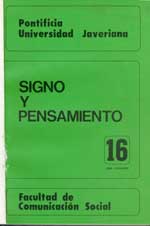Abstract
El articulo 19 de la Declaración universal de los Derechos Humanos, que constituye el núcleo y fundamento de la ética comunicacional, proclama que todo individuo tiene derecho a la libertad de opinión y de expresión, derecho que incluye el de no ser molestado a causa de sus opiniones, el de investigar y recibir información y opiniones y el de difundirlas sin limitaciones de fronteras por cualquier medio de expresión. Este derecho sin el cual no seria posible la comunicación auténticamente humana, implica a su vez un deber, proclamado también en los códigos deontológicos del ejercicio profesional del periodismo y de otras áreas de la comunicación social: “servir a la verdad” ¿Pero que es la verdad? A lo largo de la historia del pensamiento se han propuesto distintas formas de concebir este termino. En este trabaja intentara el autor proponer las que le parecen más significativas, como punto de partida para una discusión sobre el contenido referente que podríamos darle al concepto de “verdad” y a sus posibles implicaciones en el campo de la comunicación social.This journal is registered under a Creative Commons Attribution 4.0 International Public License. Thus, this work may be reproduced, distributed, and publicly shared in digital format, as long as the names of the authors and Pontificia Universidad Javeriana are acknowledged. Others are allowed to quote, adapt, transform, auto-archive, republish, and create based on this material, for any purpose (even commercial ones), provided the authorship is duly acknowledged, a link to the original work is provided, and it is specified if changes have been made. Pontificia Universidad Javeriana does not hold the rights of published works and the authors are solely responsible for the contents of their works; they keep the moral, intellectual, privacy, and publicity rights.
Approving the intervention of the work (review, copy-editing, translation, layout) and the following outreach, are granted through an use license and not through an assignment of rights. This means the journal and Pontificia Universidad Javeriana cannot be held responsible for any ethical malpractice by the authors. As a consequence of the protection granted by the use license, the journal is not required to publish recantations or modify information already published, unless the errata stems from the editorial management process. Publishing contents in this journal does not generate royalties for contributors.


